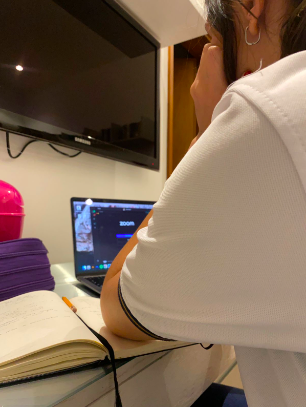
Online learning is transforming knowledge positively towards comfortable learning from anywhere. Interviews with Senior Juana Wolff mastering German and French online, Valeria Pertuz, who is learning Portuguese online to be able to get her passport, and Renato Panchianeschi, an online Italian teacher, based in Medellin.
In the midst of the pandemic’s challenges, learning has undergone significant transformation. The advantages are evident when considering the experiences of Wolff, Pertuz, and Panchianeschi. This article explores the disruptive impact of online learning.
“Online learning makes it way easier. I can learn German from a teacher in Berlin and French from someone in Medellin, while still being at home,” Wolff said.
Learning can now be done from any location. It goes beyond simply substituting computers for traditional classes; it’s more like having a large area where individuals from all around the world may come to share knowledge. This demonstrates that learning is no longer bound by location constraints. Juana emphasizes this global accessibility of online learning, highlighting how it allows anyone to access knowledge from anywhere in the world.
“The flexibility, which works excellent for me. I can change my learning schedule to suit my rhythm, making it possible for me to balance other aspects in my life during the day,” Wolff said.
Flexibility is a critical element of online learning, empowering students like Juana Wolff to take ownership of their education. Unlike the rigidity of set schedules, online learning allows for a balance between academic goals and personal lives, fostering a sense of empowerment in learners.
Valeria Pertuz, who is taking advantage of the many benefits of distance learning specially. She is now pursuing her aim of becoming fluent in Portuguese, and she started this journey with the intention of obtaining a Portuguese passport.
Valeria’s narrative serves as an example of how online learning may broaden one’s perspectives. Valeria wants to become fluent in Portuguese so she can get a Portuguese passport. She also wants to use her language-learning skills to overcome obstacles related to geography.
“I believe in the importance of language, and learning Portuguese online is not just a personal goal for me, it is also important for getting my passport. Online classes have shown me that learning is beyond the classroom, ” says Pertuz.
Valeria’s dedication to her online Portuguese studies is one of the many benefits of online learning. She highlights the strategic aspect of her language learning in addition to her language proficiency, demonstrating how online learning can be customized to reach specific objectives, even ones that go beyond academic success.
Furthermore, the effects of online learning are altering not only how Juana and Valeria learn, but also how Renato Panchianeschi, the teacher, teaches. Consider the Italian instructor Renato, who has shown incredible adaptability in this digital age. Over 150 students serve as guides in this new realm of online education, which is dispersed throughout Colombia.
Renato has evolved into a bridge that unites students from various locations and establishes an online learning environment that cuts across borders. With this virtual arrangement, he can communicate his knowledge and enthusiasm for the Italian language without being constrained by geographical distance.
“Teaching online has deepened my connection with students. Despite the physical distance, the digital platform allows for personalized attention and a focus on individual learning styles,” Renato Panchianeschi, Italian teacher, said.
Panchianeschi’s perspective emphasizes how educators and learners interact virtually. He views the screen as a bridge that makes learning more exciting and personalized when many others regard it as a problem.
“Virtual classes have prompted me to explore innovative teaching methods. Interactive tools, multimedia resources, and collaborative platforms enrich the learning journey, transcending the limitations of a traditional classroom,” Panchianeschi said.
His approach to online instruction highlights the effectiveness of online learning for educators. He is adapting his teaching methods to meet the needs of his pupils rather than simply reproducing what he did in the classroom using a computer. It seems as though he is rethinking his methods of instruction to accommodate the modern, differing ways that kids learn.
A revolutionary way of learning is created in the symphony of online learning by the innovative way of blending instructor innovations and student experiences. The experiences of Juana Wolff and Renato Panchianeschi serve as reminders of the endless opportunities and the enduring personal connection that online learning has elevated to the forefront of the global education scene as it continues to change in the digital era.


